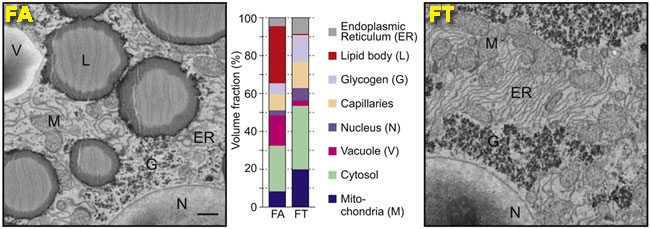Research Highlight
It's Not What You Eat But When You Eat

Figure Caption: Time-Restricted Feeding Prevents Liver Diseases(Left) Representative scanning electron microscope image of a liver from FA mice shows large lipid droplets and vacuoles that are reduced in FT liver. Scale bar, 1 μm. Measurement of several volume fractions (Middle) shows FT regimen prevents the decline in density of mitochondria and ER under ad lib HF diet (FA, Right). Measurements are from a volume rendering obtained from serial block-face images of the liver.
June 2012, La Jolla -- Researchers at the Salk Institute led by Dr. Satchidananda Panda with NCMIR collaborators, published a provocative paper In the June issue of Cell Metabolism showing that mice fed a high calorie/high fat diet on a time restricted feeding schedule were protected against obesity and related complications compared to mice eating the same amount of calories ad libitum. These results suggest that time restricted feeding could be a non-pharmacological intervention in humans that could prevent obesity and its associated metabolic disorders. Serial block face SEM imaging and analysis for this study was performed at NCMIR.
Citation: Hatori M., Vollmers C., Zarrinpar A., DiTacchio L., Bushong E. A., Gill S., Leblanc M., Chaix A., Joens M., Fitzpatrick J. A., Ellisman M. H., Panda S. (2012). Time-restricted feeding without reducing caloric intake prevents metabolic diseases in mice fed a high-fat diet. Cell Metab 15:848-860.
Online version of the article in Cell Metabolism